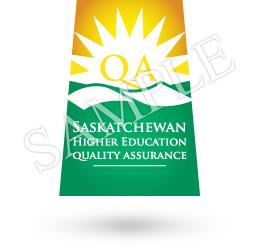In October 2012, the Saskatchewan Government proclaimed The Degree Authorization Act and The Degree Authorization Regulations making it possible for post-secondary institutions other than the University of Regina and the University of Saskatchewan to apply for authorization to grant degrees in Saskatchewan.
In accordance with the legislation, the Ministry of Advanced Education established the Saskatchewan Higher Education Quality Assurance Board (SHEQAB) to oversee a quality assurance process that ensures new degree programs in the province meet high quality standards. This process helps promote the recognition of Saskatchewan graduates both nationally and internationally for their academic achievements.
The Board works independently from, but in co-operation with, the Ministry of Advanced Education, and is supported by the SHEQAB Secretariat.
The quality assurance process consists of rigorous evaluations of the organizational capacity of the institution proposing to offer the new degree program and of the degree program itself. In each case, standards and procedures against which the applicant institution and the proposed program will be measured are available by contacting the SHEQAB Secretariat.
In addition to oversight of the quality assurance process, the SHEQAB is responsible for monitoring the fulfilment of any terms or conditions attached to the authorization of degree programs.
Mandate
The Degree Authorization Act and The Degree Authorization Regulations specify the powers and responsibilities of the Saskatchewan Higher Education Quality Assurance Board.
The Board's primary duties are:
- Review the quality assurance standards that are used in the evaluation of degree programs to ensure that they remain current and aligned with national standards;
- Review the quality assurance review processes to ensure that they remain current and aligned with national standards;
- Undertake quality assurance reviews of programs referred to the Board by Cabinet;
- With respect to each application referred to it, make a recommendation to the Minister, in writing:
- to issue the authorization with or without terms and conditions; or
- to reject the application for authorization.
- Monitor the fulfilment of any terms or conditions attached to the authorization of a degree program;
- Conduct quality assurance reviews of degree programs that are subject to renewal of their authorization;
- At the Minister's request, provide insight and advice on matters related to higher education in Saskatchewan.
The Board may also:
- Interact and share best practices with similar quality assurance bodies in Canada and abroad;
- Foster knowledge-transfer and capacity-building by organizing or participating in workshops, symposia and training programs on quality assurance;
- Create greater awareness of the quality of advanced education in the province and assist in creating a "Saskatchewan Quality Assurance Brand" by compiling, publicizing and keeping a current, comprehensive inventory of quality assurance practices and policies used in the advanced education system in Saskatchewan;
- Provide due diligence on "degree mills" and supply students and other members of the public with information about such organizations;
- Assist the ministry in the creation and maintenance of a competency matrix for members of the Board;
- Assist in the recruitment and selection of new Board members, according to the policy established by government for the process;
- At the Minister's request, submit a report respecting any matter within the Board's functions, powers and terms of reference; and
- Exercise any other prescribed powers and perform any other functions as articulated in the regulations accompanying The Degree Authorization Act.
The Secretariat to the Saskatchewan Higher Education Quality Assurance Board
The Board works independently from, but in cooperation with, the Ministry of Advanced Education. The Board is supported by the SHEQAB Secretariat which is provided by the Ministry of Advanced Education.
The Secretariat assists the Chair and Board in their activities by providing advice on policy and procedure, organizing meetings, setting agendas, co-ordinating all activities of the Board's organizational and program review expert panel teams, and preparing publications. It also receives initial applications from institutions and prepares them for the system co-ordination review stage.
The Secretariat can be contacted by telephone at 306-787-1782 or by email at info@quality-assurance-sk.ca.
Seal of Approval
When an institution is authorized to offer a degree program in Saskatchewan, it is granted the ability to use the Saskatchewan Higher Education Quality Assurance Board Seal of Approval. This identifies the program(s) that have met SHEQAB's quality assurance standards.









